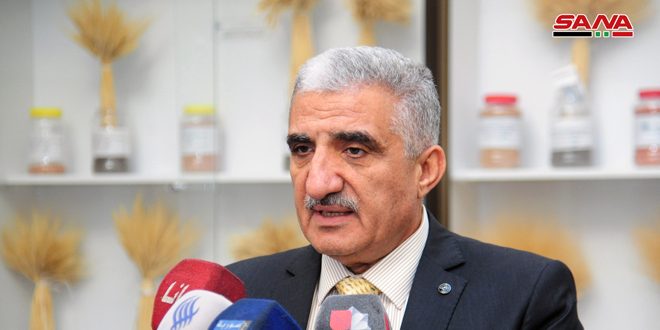The Arab region is exposed to great changes in rainfall rates from year to year. It is threatened by the scarcity of rain for being located within the arid and semi-arid regions. This is clearly reflected in the scarcity of available water resources, and will have a great impact on agricultural production and thus the availability of food and food security.
Scientific researches in the field of climate change, especially in the Arab region, show that the latter will be exposed to the most severe climatic changes, whether in terms of reduced rain rates or higher temperatures, in addition to a clear increase in the frequency of drought cycle. According to the opinion of a number of experts, these factors negatively affect agricultural productivity in relation to rain-fed and irrigated crops.
Director of Water Resources Department at the Arab Center for Studies of Arid Areas and Dry Zones (ACSAD) Dr. Ihab Janad said in a statement to SANA that climate is the largest factor affecting the agricultural sector due to its impact on plants and soil. The matter does not stop at this point, but climate changes affect the quality of the product as well.
According to Janad, an integrated assessment has been developed that includes climate change forecasts, hydrological modeling, and socio-economic vulnerability in the Arab region. It was called RICAR. It is a project that realizes the potential impacts of climate change on development in the Arab region.
In turn, Eng. Zaher Mgarkish from the Land and Water Directorate at the Ministry of Agriculture and Agrarian Reform stated that ensuring food security and food sufficiency of countries is closely linked to climate change. He called for training engineers and technicians in the Ministries of Water Resources and Agriculture to extract climate data from global and Arab platforms through using geographic information systems and to get acquainted with adaptation measures for climate changes to control the negative impact on the agriculture and water sectors and to assess the impact of climate change on these two sectors.
In turn, Dr. Salah Abdoun from Sudan, an expert in ACSAD, confirmed that the high temperature led to a decrease in the rates of rain in some areas and an increase in others. This led to droughts in some areas and floods and torrents in others. This requires each country to be aware of the impact of the climate changes on its water resources and to have knowledge of rainfalls and of what to do in the event of droughts or floods.
The Director of ACSAD Organization, Dr. Nasr Al-Din Al-Obaid, stated that during the past ten years, ACSAD has given advanced priority to the issue of climate change and adaptation to its effects. It has implemented several projects and studies in this field, including various projects in the agricultural and water sectors.
Al-Obaid underlined the need to enhance and raise the efficiency of the Syrian and Arab scientific and technical cadres working in the water and agricultural sectors for the benefit of sustainable development processes and projects in Syria and the Arab region.
Inas Abdulkareem

